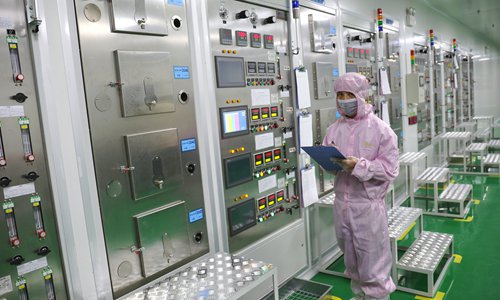National support to accelerate semiconductor shift toward China amid US crackdown on Huawei: veteran analyst
By Shen Weiduo Source:Global Times Published: 2020/5/19 21:11:48

A worker at a semiconductor firm based in Chizhou, East China's Anhui Province Photo: VCG
Global semiconductor centers will accelerate their shift toward China, with top-down support for domestic firms and the urgent demand for self-reliance and de-Americanization of China's chip sector in the face of the US chip block on Huawei, industry insiders said.
The US' relentless and ridiculous suppression of the Chinese telecom giant also makes China's tech sector realize that self-reliance is the only way forward.
On Friday, the US Department of Commerce said it was amending an export rule and its Entity List to "strategically target Huawei's acquisition of semiconductors that are the direct product of certain US software and technology," according to a statement on its website. The rule will come into effect on Friday but with a 120-day grace period.
The move is not only a heavy blow to Huawei but is also an alert to many Chinese firms and the country's chip sector, which still lags behind that of the US. "Previously, it was neither urgent nor necessary for China to invest heavily in the chip sector, since US' products are both cost-effective and high quality, but things are going to change forever," Xiang Ligang, director-general of the Beijing-based Information Consumption Alliance, told the Global Times on Tuesday.
"The whole industry may integrate resources to support the growth of relevant firms, and more firms will give domestic substitutes a try even though they are not fully mature yet," Xiang said.
The time when Chinese enterprises prefer to use US chips and other components imported from the US may come to an end, said Xiang, noting that the US will pay a heavy price for its decision, which will affect major US tech firms like Qualcomm.
Apart from support on the industry side, in a guideline from the central government on Monday, the country also vowed to establish a "national system" to push forward key technology breakthroughs and use national scientific resources to focus on key areas and projects.
The policy, in many insiders' eyes, is a signal that the country will invest more money and resources in key firms such as Shanghai-based chipmaker Semiconductor Manufacturing International Corp (SMIC), to support Huawei amid this difficult time.
SMIC has already secured investment worth $2.2 billion from Chinese state investors, the company announced on Friday, the same day that the US announced new restrictions on Chinese tech company Huawei.
Chip-related shares also closed high in China's stock market on hopes for policy stimulus, with many stocks rising by the daily limit.
"The country's chip sector will still need years of hard work before it can rival the US, but we can count on the rapid rise of chip firms such as SMIC," an industry insider surnamed Li told the Global Times on Tuesday.
"With the top-down resolution, we have confidence in the country's chip sector," Xiang said.
Progress has already been made. China's first semiconductor laser stealth wafer cutting machine has been successfully developed recently, leading the world in key performance parameters and will shake off reliance on imports of related equipment, according to China Greatwall Technology.
As the US chip ban will inevitably affect Huawei's consumer businesses, Huawei can also consider its own countermeasures, experts said. For instance, Huawei can also consider developing its own 5G and 6G technology routes and standards, without the involvement of any US firms, depending on the vast markets in China and countries along the China-proposed Belt and Road Initiative, Li said.
Huawei's global consumer business sales volume achieved growth in the first quarter this year despite the pandemic and the US crackdown. Smartphone sales dropped by 17 percent, but personal computer sales surged by 120 percent, the company revealed at its annual Global Analyst Summit on Tuesday.
Posted in: INDUSTRIES